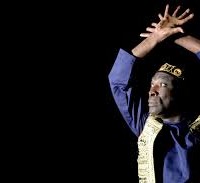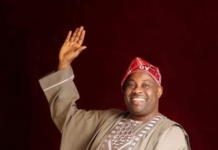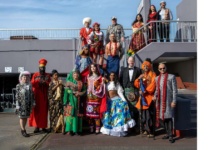
By Jahman Oladejo Anikulapo – The Dancer, Choreographer and Founder of Sakoba Dance Company, UK, was reported dead on August 13, 2015 in Manchester, where he had been running a Dance workshop. Details of the circumstances of death are still being put together by the Police in London, and will be reported here as soon as it is clear. Mr Peter Badejo (OBE) of badejoArts, and Alhaji Teju Kareem (CEO Mirage Multimedia Company), two of his close associates are on top of the case, and are already in touch with his family both in the UK and in Ibadan, Nigeria.
Bode Lawal MA (emca), is hailed as one of the finest exponents of creative African dance working in Britain. He studied dance, choreography and drama before being invited to join the Nigerian national dance troupe with which he toured internationally, winning the Ministry of Culture’s Dancer of the Year award in 1985. After this success, he moved to Britain to form Sakoba (meaning new dawn), to celebrate the rich traditions of African dance and music and to spread the profound messages encapsulated in his choreography across Europe. In 1990 he was asked to choreograph Macbeth for the English Shakespeare Company, directed by Michael Bogdanov, which also formed part of an exchange programme with the Santa Monica Playhouse. In 2003 Bode was invited by the Dean of Faculty of Arts and Architecture to UCLA as a visiting dance professor, teaching intercultural choreography in the World Art and Cultures department Los Angeles, California. Due to the great interest in his visionary work, Bode was encouraged to establish Sakoba’s sister company in Los Angeles in order to promote the understanding and appreciation of his unique choreography and technique. This company has received sponsorship from some renowned personalities including Jamie Lee Curtis, Christopher Guest, Sharon Stone, James Cameron and the Oprah Winfrey Foundation, allowing the Company to perform at the prestigious Jacobs Pillow Dance Festival in Massachusetts. Bode Lawal, upon completing his sabbatical, returned to the UK where
he arrived with a fresh and compelling new dance language. He is also in great demand as a teacher and residency tutor and has won numerous National and European awards for his choreography and performances alike. In 2002 Bode Lawal was awarded The Dance Artist Fellowship “Men of Merit” Award for Outstanding Contribution to Dance. His recent choreography “Clockwork” won the ‘Performance of the Year 2006’ in The Journal Culture Awards. Lawal Dance Technique Bode Lawal’s inspiration originates from ancestral ritualistic movements embedded in Yoruba tradition of the orisas. Movements and gestures inspired by the foundation of Sango (god of thunder) and Oshun (goddess of river) form the basis of the technique. It demands of its practitioners grounding, sincerity and understanding of the connection and importance of spiritualism and physicality. This technique can be an open ended study for any dedicated practitioner with positive energy and the will to work undeterred by challenge. It is a rich aesthetic experience of a quest for truth and originality of self-being that can be practiced as an art form as well as being taught in institutions. The reason behind the development of the Bode Lawal Dance Technique is the need to nurture and guide upcoming African dance students or indeed anybody with a genuine interest in understanding the essence of African dance tradition within the context of the African Diasporas; The gateway to this endless journey being the ritualistic and symbolic dance of the Yoruba tradition. Bode Lawal Dance Technique is also intended to emphasise the higher aspect of African dance beyond cultural tourism and other trivial or nonsensical realms in which African dance is frequently expressed. It maintains and honours the vital link between progress and tradition. By dwelling in the realm of human consciousness, it naturally embraces and complements all styles of dance while remaining rooted in the tradition of the orisas. Bode Lawal stresses the point that practitioners and students alike should understand the source of the technique and its use as a vehicle for creating dance movements and choreography. The technique should be seen as a guide and inspiration for developing one’s own vocabulary and style; a vehicle that is driven by the human spirit.









Sadly, he is still sitting in a morgue in Manchester, as none of his family or ‘so-called’ friends are bothered. So sad.
Comments are closed.